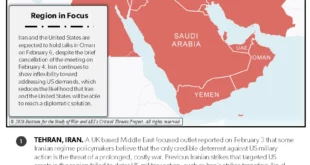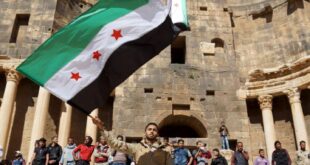 AMARA, Iraq (Reuters) – Supporters of anti-American cleric Moqtada al-Sadr accused Iraqi security forces on Friday of heavy-handed action in a crackdown in the southern city of Amara, calling it a “clear provocation”.
AMARA, Iraq (Reuters) – Supporters of anti-American cleric Moqtada al-Sadr accused Iraqi security forces on Friday of heavy-handed action in a crackdown in the southern city of Amara, calling it a “clear provocation”.
Adnan al-Selawi, head of the Sadr movement’s office in Amara, 300 km (185 miles) southeast of Baghdad, said the Shi’ite cleric’s supporters had hoped the security sweep in the city, which began on Thursday, would be professional.
“But unfortunately we found many breaches and violations,” he told Reuters, accusing security forces of insulting and harassing civilians, random shooting and beating people.
The crackdown by the Iraqi army and police, backed by U.S. forces, is the latest phase in Shi’ite Prime Minister Nuri al-Maliki’s drive to impose law and order throughout Iraq.
Maliki has thrown down the gauntlet to Sadr by sending forces into strongholds of his Mehdi Army militia in the southern city of Basra, Baghdad and now Amara, reputed to be a key arms-smuggling centre close to the Iranian border.
The government says the operation is aimed at rounding up wanted criminals and seizing heavy weapons. Maliki’s office has said Sadr’s supporters should not be detained simply because of their affiliation with the cleric.
But Sadrists say they are being singled out.
Selawi accused security forces of tearing down billboards showing pictures of Sadr while leaving alone billboards for other religious groups.
“This is a clear provocation,” he said.
The head of the security committee for surrounding Maysan province, Latif al-Tamimi, said just 17 people had been detained, and two had since been released.
SECURITY SWEEP
However, Selawi said many people had been arrested, including about 200 members of the police force in Maysan, who he said authorities suspected of being Sadr supporters.
Nevertheless, he said he had told members of the Mehdi Army militia not to respond with violence. “If there is a violation, he must confront this with a smile,” he said.
The imam of a key mosque in Amara, Sattar al-Battat, criticized the security sweep at Friday prayers, saying: “They didn’t give the Sadr office a chance to say anything, as if the Sadr office is not concerned with security.”
The operation, including raids on houses of suspected militants, appears to have met no resistance, in contrast to the Baghdad and Basra operations when government forces met fierce opposition from the Mehdi Army until truces restored calm.
Among those being held was Amara’s mayor, Rafea Abdul-Jabbar, a Sadr supporter. Sadrists said he was innocent.
The U.S. military said in a statement it was providing “advisory assistance” to Iraqi forces in the Amara operation.
It said Iraqi security forces had seized a militia headquarters after finding a weapons cache containing 676 mines, 249 mortar rounds and 241 rocket-propelled grenades.
Separately, the U.S. military said Iraqi forces had captured a suspected “special groups” leader in Baghdad on Thursday.
That is military jargon for rogue elements of Sadr’s Mehdi Army. The U.S. military says the groups receive weapons, training and funding from Iran, a charge Tehran denies.
The U.S. statement drew a link between the “special groups” and Sadr’s movement, saying the suspect was alleged to have close ties to Sadr headquarters in the holy city of Najaf.
Analysts say Sadr is pursuing a twin strategy — trying to regain control of his unruly militia while avoiding a confrontation with the government that he knows he could not win because Maliki is backed by immense U.S. firepower.
Maliki has been criticized in the past for lacking resolve to stabilize Iraq — especially in cracking down on fellow Shi’ites. But he has gained a measure of respect at home and abroad for recent offensives, which have helped reduce violence to the lowest level in more than four years.
 Eurasia Press & News
Eurasia Press & News



